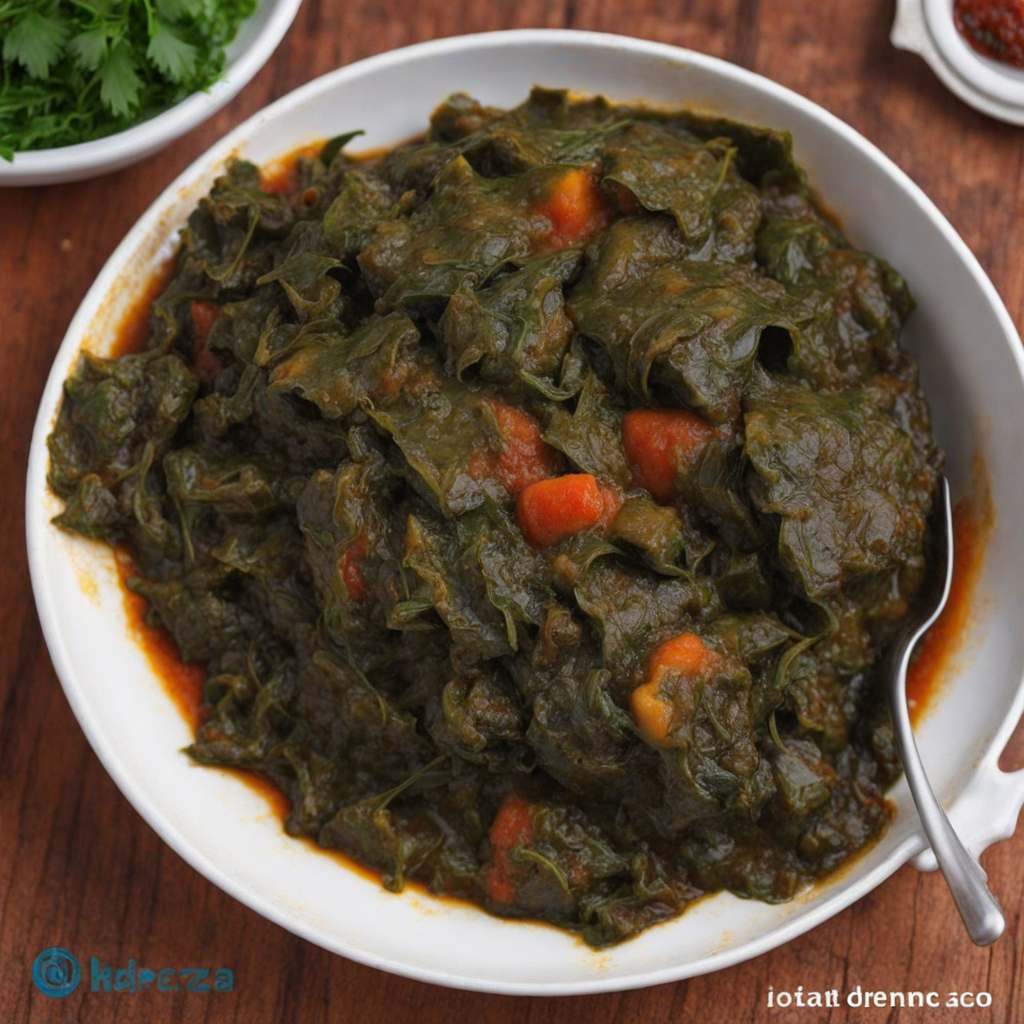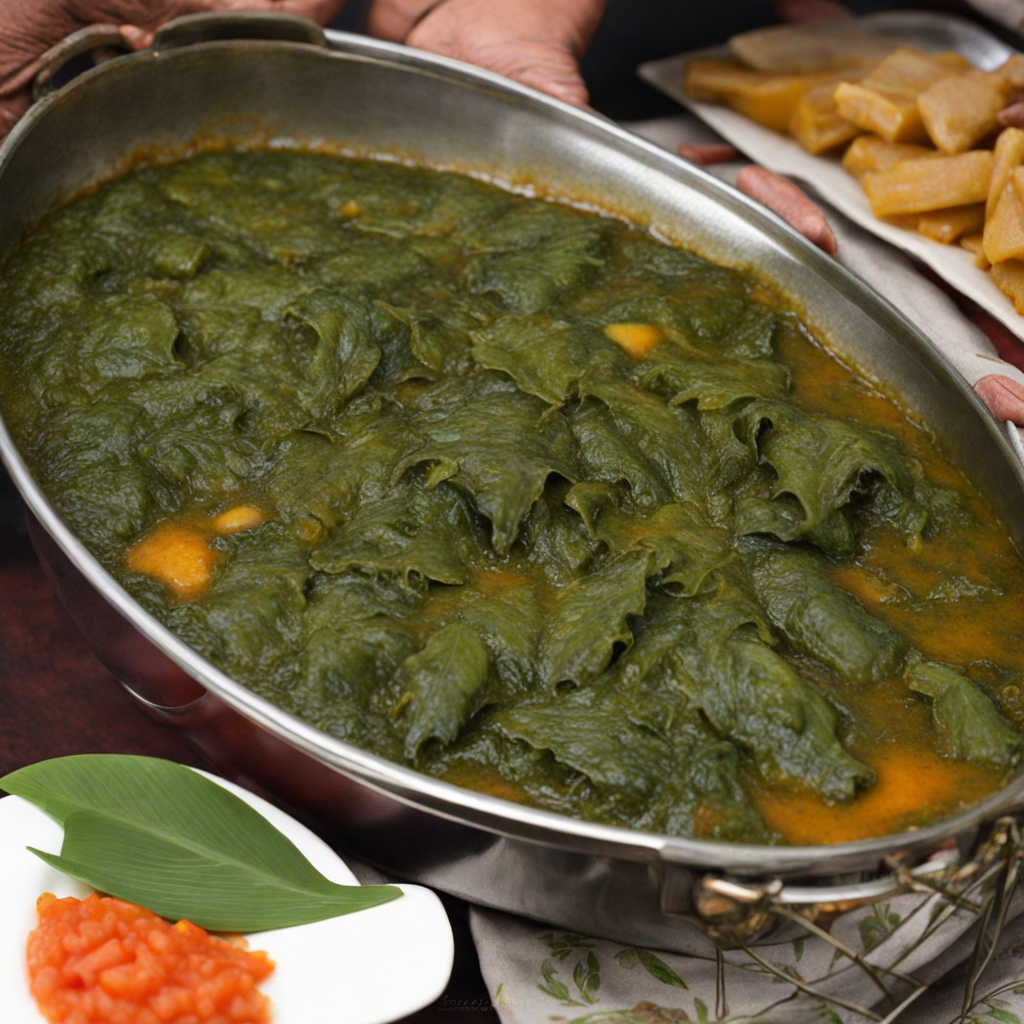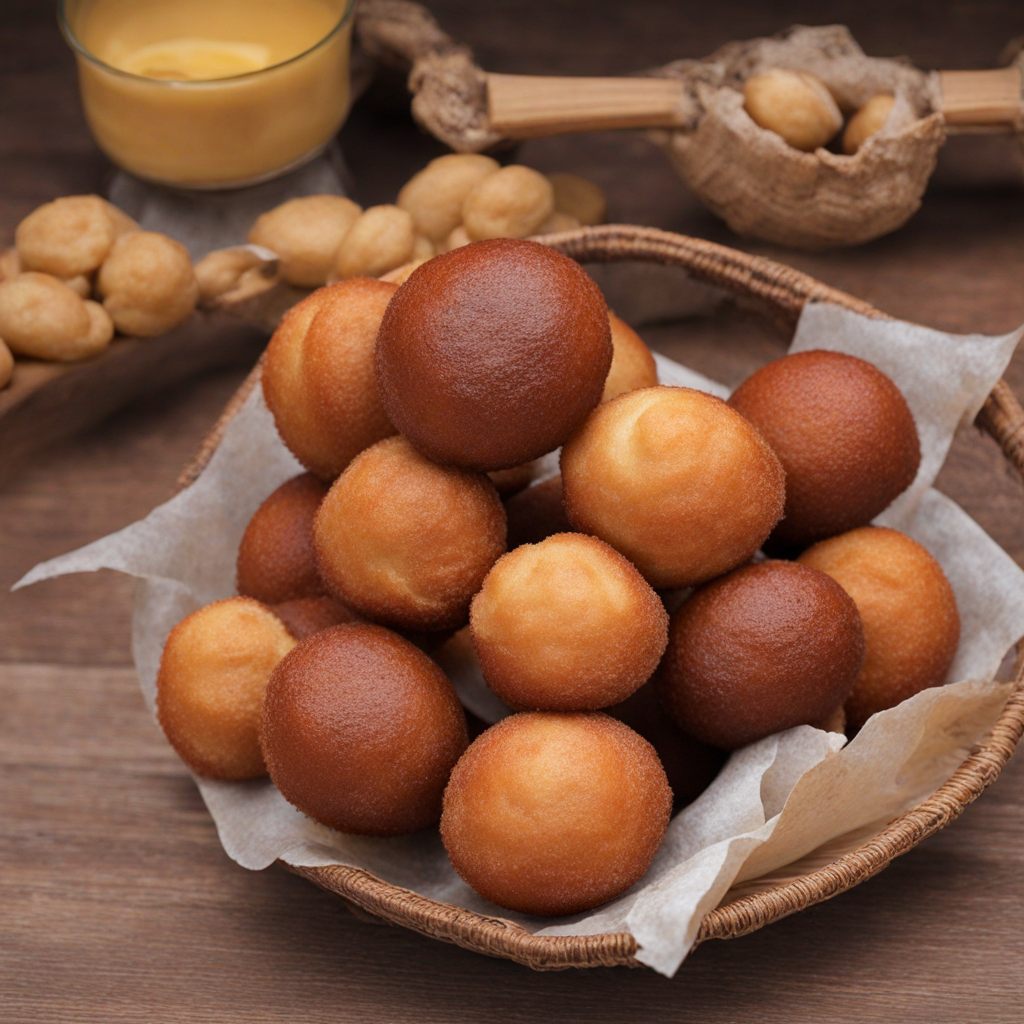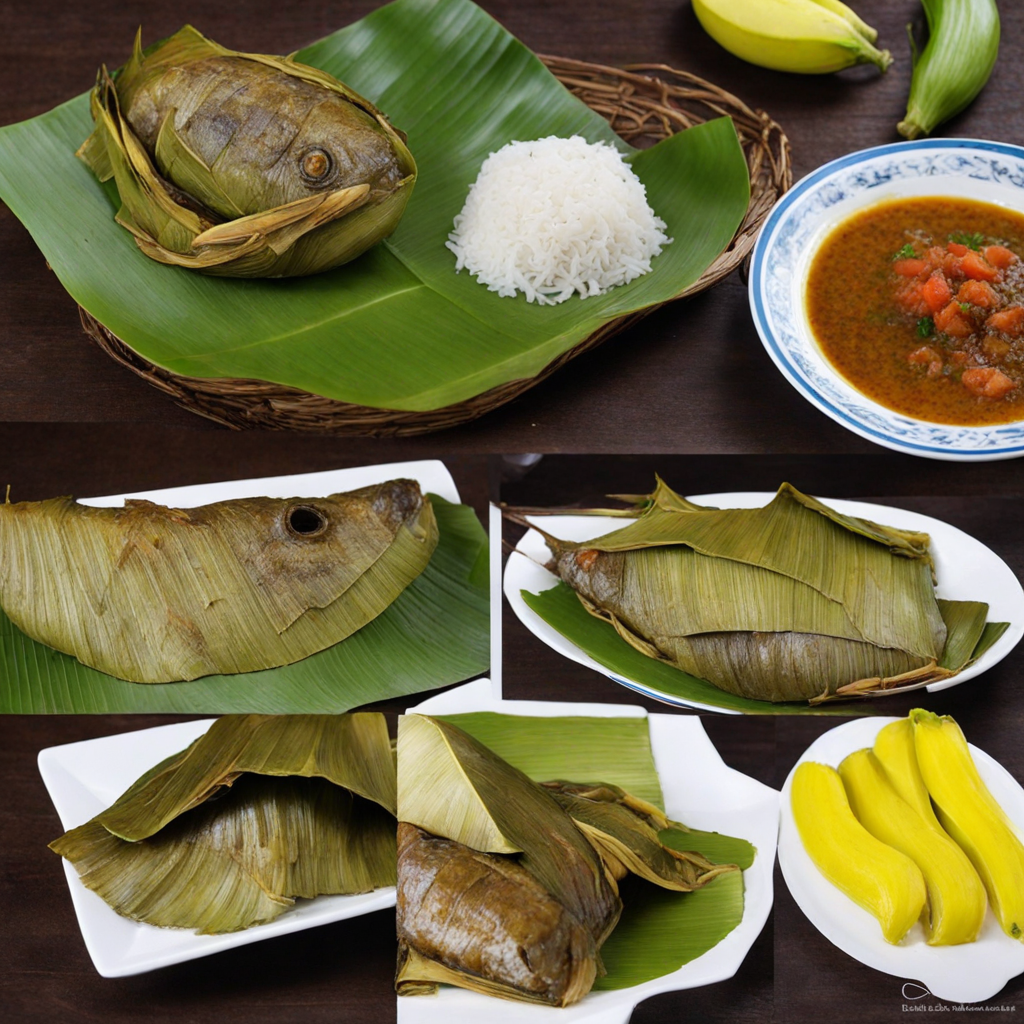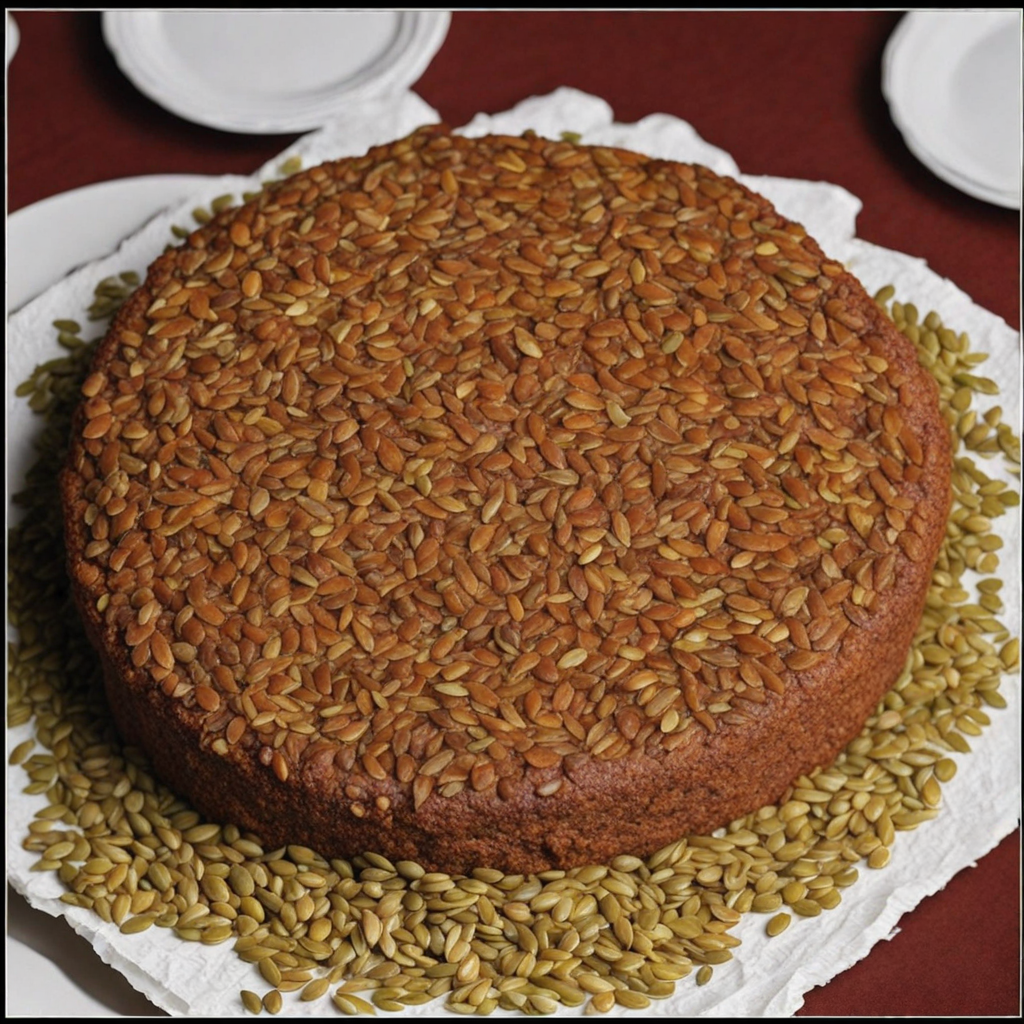Pondu
Pondu, a traditional dish hailing from the Democratic Republic of the Congo, is a delightful culinary experience that showcases the rich flavors and textures of the region. At its core, Pondu is made from cassava leaves, which are finely chopped and cooked down to create a thick, hearty stew. The leaves are often mixed with ground peanuts or palm oil, giving the dish a creamy consistency and an earthy, nutty flavor. The addition of spices and seasonings, such as garlic, onion, and sometimes chili, enhances the overall taste, making it a savory delight that is both comforting and satisfying. One of the most appealing aspects of Pondu is its versatility. It can be enjoyed as a main dish or served as a side alongside various staples such as rice, plantains, or fufu, a starchy dough-like food made from cassava or yams. This adaptability makes Pondu a popular choice for family gatherings and communal meals, where it brings people together over a shared love of good food. The dish is often accompanied by grilled meats or fish, adding a protein element that complements the rich, leafy flavors of the Pondu. Eating Pondu is not just about savoring its unique taste; it’s also a cultural experience that connects you to the traditions of the Congolese people. The process of preparing Pondu is often a communal activity, involving family members gathering to clean, chop, and cook the cassava leaves. This connection to the land and community is reflected in every bite, making Pondu not just a meal, but a symbol of heritage and togetherness. For those looking to explore new culinary horizons, Pondu offers a delicious entry point into the vibrant flavors of Central African cuisine.
How It Became This Dish
The History of Pondu: A Culinary Jewel of the Democratic Republic of the Congo Origins of Pondu Pondu, also known as "saka-saka" in some regions, is a traditional dish from the Democratic Republic of the Congo (DRC) that has deep roots in the country’s agricultural practices and cultural heritage. The dish primarily consists of cassava leaves, which are a staple in Congolese cuisine. Cassava, a tuber native to South America, was introduced to Africa by Portuguese traders in the 16th century. Over time, it became a crucial crop, especially in Central Africa, due to its resilience in diverse climates and its ability to thrive in poor soil conditions. The preparation of Pondu involves a meticulous process. The cassava leaves must be properly prepared, as they contain cyanogenic compounds that can be toxic if consumed raw. Traditionally, leaves are harvested, washed, and then boiled to remove these harmful substances. After boiling, the leaves are often pounded or chopped finely and then cooked with palm oil, spices, and sometimes meat or fish, creating a rich, flavorful dish that is integral to the Congolese diet. Cultural Significance Pondu is not just a meal; it is a symbol of cultural identity and community in the DRC. The dish is commonly served during family gatherings, celebrations, and important life events such as weddings and funerals. Its preparation often involves collective efforts, with family and friends coming together to wash, chop, and cook the leaves. This communal aspect of cooking reinforces social bonds and reflects the importance of community in Congolese culture. In the DRC, Pondu is often accompanied by "fufu," a starchy side dish made from cassava or plantains that is used to scoop up the leafy stew. This combination highlights the balance of flavors and textures that characterize Congolese cuisine. The dish is also versatile; while the basic version typically includes just cassava leaves and palm oil, regional variations may incorporate local ingredients like smoked fish, peanuts, or meat, showcasing the diversity of the DRC's culinary landscape. Development Over Time Historically, the DRC has faced numerous challenges, including colonization, political instability, and economic hardships. These factors have influenced the evolution of Pondu and its preparation methods. During the colonial period, the Belgian administration introduced new agricultural policies that altered local farming practices. Despite these disruptions, cassava remained a resilient crop, and Pondu continued to be a staple in the Congolese diet. In the post-colonial era, the DRC experienced significant social and economic changes. As urbanization increased, many rural families migrated to cities in search of better opportunities. This shift altered food preparation and consumption patterns. In urban areas, Pondu is often prepared in a more streamlined manner, using pre-packaged cassava leaves available in markets, allowing families to maintain their culinary traditions despite the constraints of modern life. Throughout its history, Pondu has also been a marker of resilience. During times of crisis, such as the civil wars that plagued the DRC in the late 20th century, Pondu served as an accessible and nutritious food source. It became a symbol of survival, with families relying on the dish to feed themselves during periods of scarcity. The adaptability of Pondu—its ability to incorporate whatever ingredients are locally available—has ensured its continued importance in a changing world. Pondu in Contemporary Society Today, Pondu remains a culinary staple in the DRC and among the Congolese diaspora worldwide. It is celebrated not only for its nutritional value but also for its rich flavors and cultural significance. In urban centers like Kinshasa and Lubumbashi, restaurants and street vendors offer various renditions of Pondu, catering to both traditional and modern palates. The dish has gained recognition beyond Congolese borders, contributing to the growing interest in African cuisine globally. The resurgence of interest in traditional cooking methods has led to a revival of Pondu in home kitchens. Many Congolese families emphasize the importance of passing down recipes and cooking techniques to younger generations. Cooking Pondu is often seen as a way to connect with heritage and foster a sense of pride in Congolese culture. Furthermore, Pondu has become a symbol of cultural diplomacy. Congolese chefs and food enthusiasts have begun showcasing Pondu at international food festivals and culinary events, promoting the dish as a representation of the DRC’s rich culinary heritage. This visibility not only elevates the status of Pondu but also fosters cross-cultural exchanges, allowing people from diverse backgrounds to appreciate the dish's flavors and history. Conclusion Pondu is more than just a dish; it is a reflection of the Democratic Republic of the Congo's history, culture, and resilience. From its origins rooted in the agricultural practices of the region to its contemporary role as a symbol of identity and community, Pondu has evolved while remaining a steadfast staple in Congolese cuisine. The communal preparation of Pondu and its presence at significant life events highlight the dish's cultural significance, reinforcing social bonds among families and communities. As the world becomes increasingly interconnected, the appreciation for traditional foods like Pondu continues to grow. As Congolese chefs and home cooks share their culinary heritage with the world, Pondu stands as a testament to the richness of African cuisine and the enduring spirit of the Congolese people. Whether enjoyed in a cozy home kitchen or a bustling city restaurant, Pondu embodies a story of survival, community, and cultural pride that resonates with all who have the pleasure of experiencing it.
You may like
Discover local flavors from Democratic Republic Of The Congo


